PwC’s U.S. chairman has permanently opened the door to frank and honest dialogue about difference in the workplace at his firm and recruited the country’s top CEOs to an effort to improve corporate diversity, inclusion, and communication nationwide.
Tim Ryan, the senior partner and U.S. chairman of PricewaterhouseCoopers, is the youngest executive of the Big Four auditing firms, which include Deloitte, Ernst & Young, and KPMG. Though he only assumed the role last July, at the age of 50, he has already made a name for himself, bringing PwC to new economic heights while simultaneously leading the conversation about diversity and inclusion in the workplace.
Ryan’s story is the story of the immigrant dream. He was born in Boston, a second-generation working class Irish American whose father’s parents had emigrated from counties Galway and Cork, and raised in the Hyde Park neighborhood at the southern reaches of the city limits until his family moved just over the border to Dedham, a blue collar suburb, when he was seven.
He is the second child of four siblings, with an older brother and two younger sisters. Both his parents worked. His father had two jobs – a day gig as a lineman at Boston Edison utilities and a graveyard shift at the Boston Herald; his mother worked as a cashier at the local branch of the small New England grocery chain Roche Bros. Together, he says, his mother and father emphasized the singular importance of working hard, often at the expense of other activities. Ryan jokes often that he doesn’t have a single memory of doing homework.
Despite that, he was the first member of his family to attend college, attending Babson College because they offered the most financial aid. Today, as a result of his own hard work and determination, as well as innate talent for managing people, he now has the responsibility of running one of the most influential professional services firms in the U.S. It has been a remarkable journey, and when I met with him on the 25th floor of PwC’s midtown Manhattan headquarters, it was a long way from where he started out.
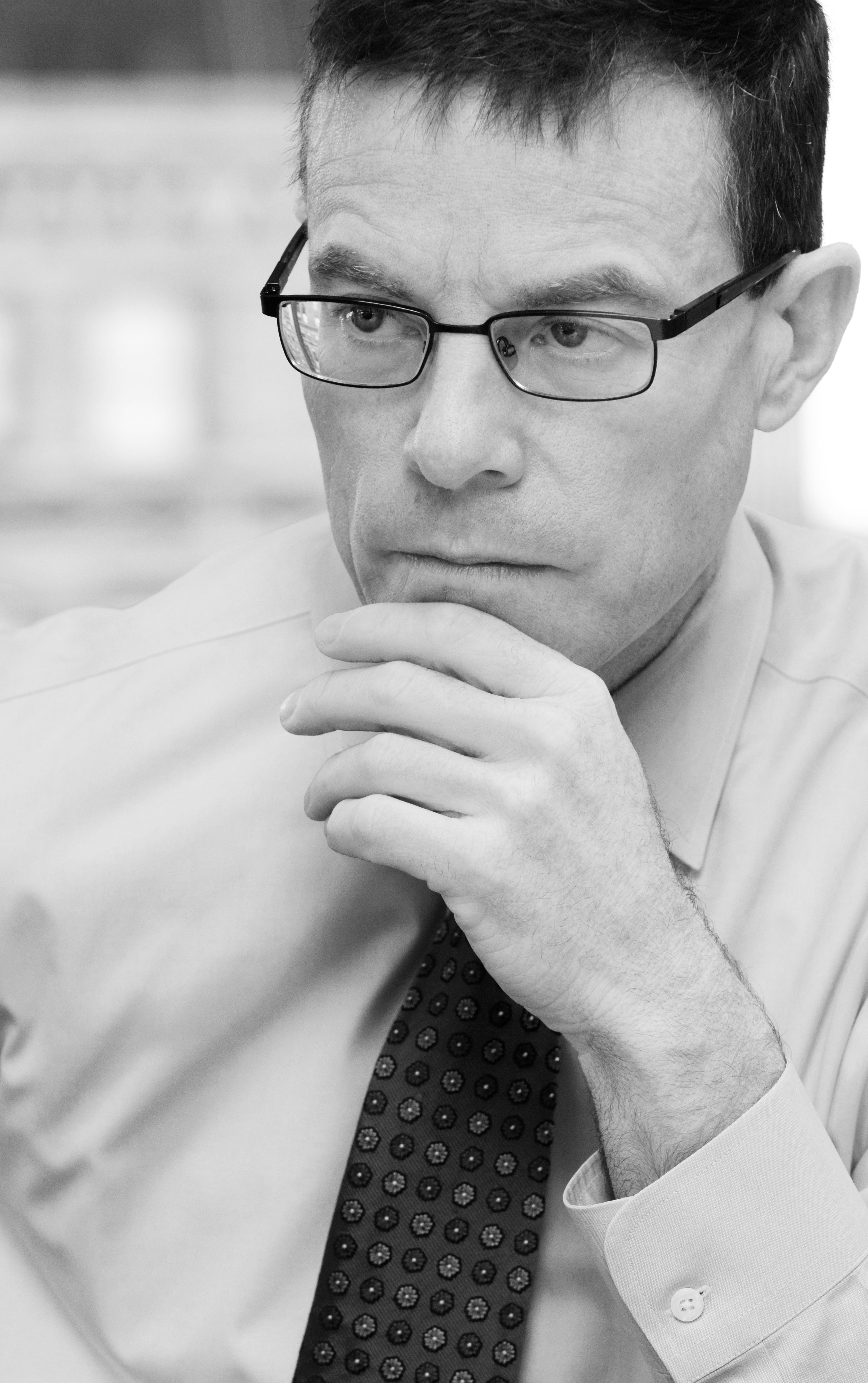
Ryan is a lean man with full, brown hair that he keeps in the traditional business style of trim utility. He religiously works out, a holdover from his high school days playing ice hockey, rising early five to six days a week – he takes Mondays off for travel – to perform his morning routine: 600 sit-ups, 75 push-ups, and a three-mile run. To date, he’s competed in 26 marathons, with his best time being 3:51 in Chicago a few years ago. “With my work schedule, I’m proud of that,” he says (though his fantasy is to take a six-month sabbatical and just train to see what he’s really capable of).
He is happy explaining concepts and teaching ideas to other people, but he seems happiest when he is learning and listening, probing and asking questions. He gets that from his parents.
“My parents were only high school educated, but they were the best educators you could have asked for because they taught us the lessons you needed to succeed in life,” he says. At his mother’s funeral two years ago, Ryan spoke about how she had always called him and his siblings out when they made a mistake, and would always promote the values of hard work, honesty, and treating people with respect.
When most people speak in platitudes about things like that, especially in eulogies, it’s easy to dismiss them as canned or cliché. When Ryan speaks about them, they are not only believable but downright inspiring. It’s because he lives an ethos of humility and earnestness, which he again credits to his parents:
“They did this unique thing when they were raising my siblings and me. They would regularly remind us to not to blame other people if we made a mistake, not to be so defensive, and to get over ourselves and stay humble. And that’s really a remarkable skill that I got from my parents. In managing PwC’s 50,000 people or when I’m working with other Fortune 1,000 CEOs, I’d never succeed if I got defensive every time somebody challenged me. This life lesson of not taking yourself too seriously goes all the way back to my Irish upbringing. That came from my parents.”
Ryan also credits his Irish ancestry with simpler things like his knowledge of tea and family Sundays: “It was the good old days. It was family dinner on Sundays. The supermarkets were closed. It was tea; I learned so many things about tea, like how to put the spoon in, and how to not let the heat out of it, and what a good cup of tea was and what a good cup of tea wasn’t.”
Ryan has had a relationship with Ireland professionally since the 1991 New England banking crisis – one of his clients was a New Hampshire bank owned at the time by Bank of Ireland, and as a result was the only one in the state not to be taken over by the FDIC, he told me. Since then, he has been to Ireland at least half a dozen times.
“What I love most about the people from Ireland who I interact with in the business community – executives at clients as well as at PwC – is their sense of responsibility, which is very clear. It goes beyond the dollar, beyond the money,” he says.
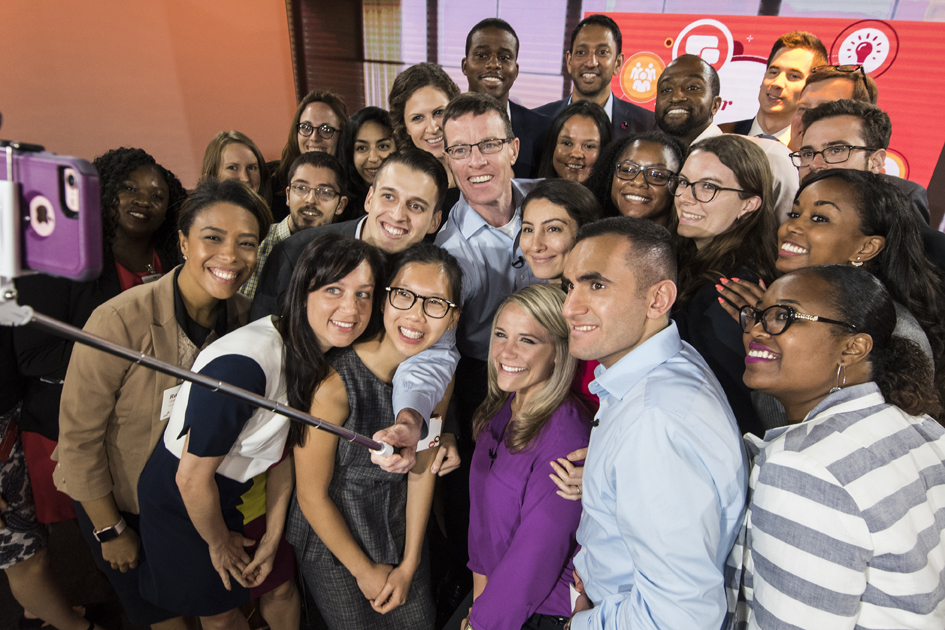
When he was 14, Ryan joined his mother at Roche Bros. supermarket, taking a job stocking shelves. That’s where he found his other chief mentor, his manager Richie Ordway, who he credits more than any other figure in his life with his professional development. “He just understood people, and he was the one who really helped me understand relationships and the idea of inspiration versus telling.”
Ryan worked there for ten years – throughout all of high school, for 40 hours per week during college in order to pay for it, and moonlighting during his first two years at Price Waterhouse, which wouldn’t merge with Coopers & Lybrand to become PwC until 1998, after he graduated. “I’m kind of famous for telling stories about the supermarket because it was so formative to me in terms of how you treat people, your work ethic, the idea of the customer always being right, growth, and respect for people.”
One of those stories Ryan has told numerous times over, in various media appearances and in private. It does not cast a good light on his high school personality. He and his friends were making fun of a special-needs co-worker behind his back and Ryan was leading the assault. Ordway overheard and stopped him in his tracks. “He said, ‘He’s giving 100 percent of what he can give. Are you?’ That I’ll never forget.” It was his first lesson in what Ryan calls sustainable motivation, or trust-based leadership, the idea of managing fairly based on what people are capable of doing in order to get the most out of them and empowering people to make decisions.
Another story Ryan tells less often also involves him getting a dressing down. “I prided myself on working hard. I prided myself on working harder than anybody else – always be sweating, always be going. So one day I was killing myself and I looked at him for approval. And he looked at me and he said, ‘Thanks for doing your job.’ He always knew the buttons to push. He made it clear: your job is to work hard.”
Because of his experiences with the family-run Roche Bros., Ryan wanted to be an entrepreneur himself. He applied to colleges and was admitted to several, but accepted at Babson, just west of Boston, not knowing anything about the school except that they gave him the best aid package. “For me it was a whole new world. The diversity at Babson was tremendous. There was a big Latin American presence, even back then. So for somebody from Dedham, it was like, ‘Wow.’”
It was also his first experience being on the receiving end of socio-economic differences. In a crowd of mostly affluent students and parents in business casual, his father dropped him off wearing his work boots, jeans, and a t-shirt while on lunch break and Ryan made the walk to his dorm carrying all his belongings in an uncle’s loaned Army duffel. “There were a lot of people who were not like me,” he said.
It was in that environment that Ryan was persuaded to give accounting a try by a professor named Richard Bruno. “I think he saw, with the benefit of hindsight, that this business was about people and that I had an aptitude for that,” Ryan said. On Bruno’s recommendation, Ryan joined Price Waterhouse in their Boston office as a staff accountant in 1988. It proved to be a good career choice, and though his blue collar background stood out from the other recruits, he was a quick study and moved up the corporate ladder swiftly, but not before learning a few lessons about inequality.
Ryan started at the firm the same year the Boston office hired its first female partner, Maryann Murphy, who would become his supervisor and mentor. His first years were uneventful. But the 1991 financial crisis changed that – mortgages went through the roof and banks went under.
“I saw people losing their homes and saw the importance of the financial services,” he said. “A partner told me when you’re in financial services, you know, next to people’s health and family, you’re looking after the most important thing in people’s lives, their money.” That’s when he really got into banking, when he was able to see what Richard Bruno saw in accounting – that the business is about people and that spreadsheets have real-world consequences.
By the same token, Ryan saw that accountants are also people, and he witnessed the iniquity Maryann Murphy faced at the company. “I saw the struggles she had. She was massively supported, I will say, but as a woman she had to prove herself over and over again. That’s when I remember I started to realize it’s different. Like before I even got to race, I realized it was different for gender.”
Greater racial awareness would come a few years later, after the 1991 banking crisis, when he developed an expertise in mortgages and was given the opportunity to travel the country. “I spent time in Jacksonville, in Columbia, South Carolina, where I had clients. I started spending more time in New York where there was a more diverse population at the time even than in Boston. I realized there were differences and uphill battles that people had.” It was the first time he had left New England.
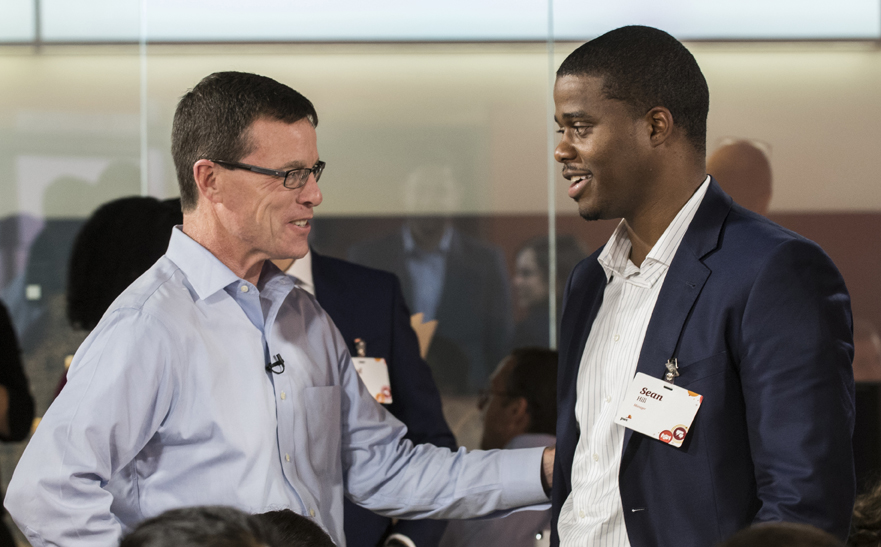
By the early 2000s, Ryan was made a partner, and was leading PwC’s consumer finance group and was serving on the U.S. board of partners and principals. In 2005, he became the head of financial services, and by 2009 was vice chairman of the assurance practice. Most recently, Ryan served from 2013 as vice chairman of U.S. markets, strategy, and stakeholders leader, where he demonstrated his ability to drive shareholder value, improve investor relations, and oversee regulatory affairs, public policy, corporate responsibility, and human capital.
What has stayed with Ryan through all of this is the experience of being an outsider on his first day almost 30 years ago, when he committed the faux pas of wearing a short-sleeved shirt. Price Waterhouse was at the time very formal, known for their employees’ dark suits, white shirts, and red ties. Ryan tried to keep his jacket on for as much of the day as possible, even as the others in his class were hanging their jackets on their chairs and rolling up their shirtsleeves. But it was a hot June day and by lunch he couldn’t take it anymore, earning the skepticism of his cohort but the sympathy of his instructor, who walked him to Filene’s Basement to buy him new long-sleeved shirts. (Ryan has since changed the dress code to “dress for your day,” which allows for significantly greater flexibility and personal expression, including jeans.)
Ryan’s management style is direct and lacks pretense, his voice still resonant with the cadences and confidence of a blue collar New Englander. It’s undeniable that he has the drive of generations of Irish ancestors who survived and strived, and that entrepreneurial spirit that allowed them to succeed in a new world despite hardship and prejudice.
“Over the course of my life there was this constant reminder that you’re fortunate, you’re lucky, and everybody deserves to be treated the same,” Ryan told me. “It was just a recurring drumbeat that came at home.”
As much as he is focused on his responsibilities to shareholders to run a profitable company today, that early education of difference has led him to need to do more with his time at the top of PwC by creating a culture where people are comfortable having dialogues about difficult subjects and there is an expectation of listening and learning from other points of view and experience, even, or especially, about subjects entirely unrelated to work.
“I think right away he felt that he was the odd man out. I think that he looked at himself a little differently,” Brian Williamson, whom Ryan hired in 1990, told me. Williamson is now an audit partner at PwC and is the godfather to Ryan’s second youngest child. (Ryan has six children, ages nine to 17, and is divorced.) “So I think when he sees other people and thinks about other people being different, he wants to make sure they don’t feel like outsiders, too,” he said.
Since 2008 PwC has worked with Mahzarin Banaji – the pioneering Harvard social psychologist who helped develop the theory of unconscious biases in the 1990s – on training its 150-or-so top partners to learn how to address their blind spots on topics like race, class, and gender, and since 2011 the firm has ranked in the top 5 of DiversityInc’s Top 50 Companies list. Ryan took Banaji’s executive training around the same time he became assurance vice chair, and it made a clear impact. Last year, as U.S. chairman, he appointed the most diverse leadership team in the company’s history.
This past June, Ryan went even further, launching a corporate alliance committed to improving diversity and inclusion in the business world and hosting a nation-wide dialogue on how to do so. He called it the CEO Action for Diversity and Inclusion, and as of September more than 300 CEOs have pledged that they will “continue to make our workplaces trusting places to have complex, and sometimes difficult, conversations about diversity and inclusion;” “implement and expand unconscious bias education;” and “share best – and unsuccessful – practices.”
The CEO Action was born out of the events that happened during the first week of July 2016, Ryan’s first week as U.S. chairman.
On Tuesday of that week, Alton Sterling was shot at least six times by police while pinned to the ground in Baton Rouge. On Wednesday, Philando Castile was shot five times by police outside of Minneapolis during a traffic stop in which he informed the officer he had a concealed carry license and had a pistol with him. On Thursday, a sniper intent on killing white police officers as retribution for the deaths of black men by police killed one Dallas Area Rapid Transit officer, four Dallas Police Department officers, and wounded 11 others, including two civilians.
That Friday, Ryan was on vacation in upstate New York. He remembers thinking, “You’re leading 50,000 people, and you now realize you’re the one who has to decide, ‘What do I do.’ Do you do something? Do you do nothing? Things happen in the news every day and the question is when do you react and when do you say that’s not a place for the firm to step in? But it clearly felt like this is something the firm should step in and say something about.”
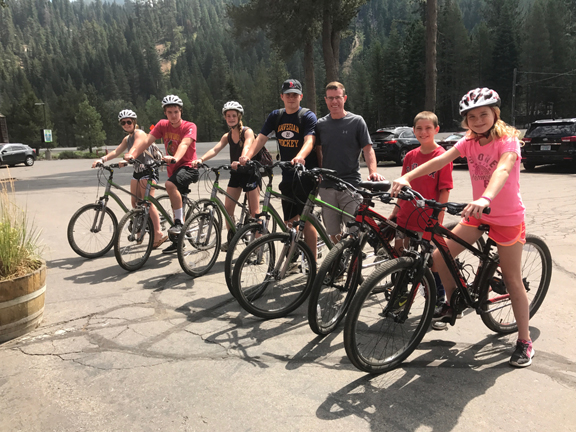
He got his leadership team on the phone immediately, including his diversity chief, human capital chief, and general counsel. They spoke for about 30 minutes and all agreed they had to do something, so Ryan decided he would send an email.
“It wasn’t an earth-shattering email,” he told me. “All I said to our people was, ‘Look, we know a lot of you are waking up and reading this news and it’s tragic and many of us don’t know what to do and that’s okay. We’re here for each other.’”
He was shocked by the responses his message received. The one that floored him was that the silence that week at PwC was deafening.
“I remember thinking, ‘Here we are, a relatively progressive organization, rated very highly for diversity and have been investing for years on diversity, and we can’t even talk about it?’ If we couldn’t talk about it, how are the organizations doing that haven’t progressed as nicely as we had?” It was a wakeup call for him. When he returned to work the following Monday, he effectively threw out his incoming plans for the firm. Instead, Ryan and his leadership team came together to propose a day on race relations at PwC, to be held July 21, firm-wide, across the U.S.
“It wasn’t terribly bold to send an email,” he said. “That was bold, that was risky.”
Since those July 21 discussions, PwC has actively encouraged employees to “bring their whole selves to work,” according to Ryan. In other words, that means one of the most influential companies in the U.S. says that it’s no longer taboo to talk about politics, the news, and personal opinions in the office. Over the course of last year, Ryan estimates he met with 300 to 400 CEOs in his role as chairman. As clients, PwC claims 96 percent of Fortune 500 companies, as well as every entertainment firm, and 97 percent of automotive firms. And with every one of them Ryan deals with, he brings up his message. So make no mistake about it, PwC’s reach is huge.
“Most first-year CEOs would pick other issues to make their mark,” Ron Parker, CEO of the Executive Leadership Council and a member of the CEO Action pledge steering committee, told me. “Tim could easily have followed the majority lead of driving shareholder value and say that we’re not going to get involved with the other – the social and political – things. But the world has changed. And Tim was courageous enough to step out of the crowd and up to the mic. And in doing so others followed.”
Under Ryan’s direction, too, PwC launched a new series of corporate-wide training videos this January that teach Banaji’s unconscious bias research in an interactive way. (Modified versions of these videos are available to the public on PwC’s website and are worth watching.) His hope is that through the CEO Action pledge, “millions” will take and use the series to start a conversation, especially at small and medium sized organizations that don’t have PwC’s “deep pockets.” So far, 30,000 of PwC’s employees have taken it, and Ryan has made it a requirement for all new hires and anyone receiving a promotion.
When I asked him whether he received any criticism over focusing on diversity and how he responded to that, he said the overwhelming response has been positive, but there will always be those who want him to focus on the majority.
“It’s not about my views, it’s about people. One of the things I learned early on is you have to put yourself in other peoples’ shoes. I fundamentally believe that the majority of the people in the world wake up in the morning trying to do the right thing. Very few people wake up and say, ‘I’m going to be bad today.’ But, we often look at the world from our perspective,” he explained. “I learned early on that you can’t tell somebody how to feel. As much as it may be logical to you or me that they should feel this way, it’s more important to go to how they feel and figure out how you work from there.”
What it comes down to, he told me, is either making an emotional argument, or a logical one, and sometimes both. “I approach it by saying what I truly believe, and I believe inclusion is the right thing to do, as the human race – that I got from my parents, to be clear. But I also believe it’s the right thing to do if you want a sustainable thriving organization. So, you either go with the intellectual approach or the heart approach. And if the heart doesn’t get you, the intellectual approach better.”
The intellectual approach is this: by 2050, white Americans will be in the minority, and there is a direct link between diversity and economic growth and brand reputation. According to a 2015 study by McKinsey, companies that rank in the top quartile of executive diversity are 20 percent more likely to show returns above the national industry median than companies in the bottom quartile. And for brands that address race publically, more than 70 percent of people of all races who are aware of it say it “made them view the company in a more positive way,” according to a 2016 study by the Center for Talent Innovation sponsored in part by PwC .
When I asked Ron Parker about this, and why he thinks Ryan has been so successful in his efforts to spread the message and grow the CEO Action pledge, he said it was just because of Tim Ryan the person. “No one is doing this because of Tim Ryan, U.S. chairman of PwC. They are doing this because they see the authentic, open, and fully transparent reasons why Tim is doing it.”
It’s hard to say for sure, after just over a year of Ryan’s leadership, where this is heading, but at the very least it means that one of the country’s most influential and traditional companies has permanently moved the benchmark about what is and is not appropriate to talk about at work, encouraging difficult discussions that otherwise would never take place, and mandating unconscious bias training. It also means that every one of PwC’s clients hears about it, directly or indirectly, each time they meet with someone from the firm.
Maybe most importantly, and most specifically, it means that an Irish American man from working class Boston in a position of power recognizes that there is a long, long way to go and is trying to do something about it: “You don’t change your culture on anything one and done. You have to be committed, focused, deliberate, and over a sustained period of time.” ♦

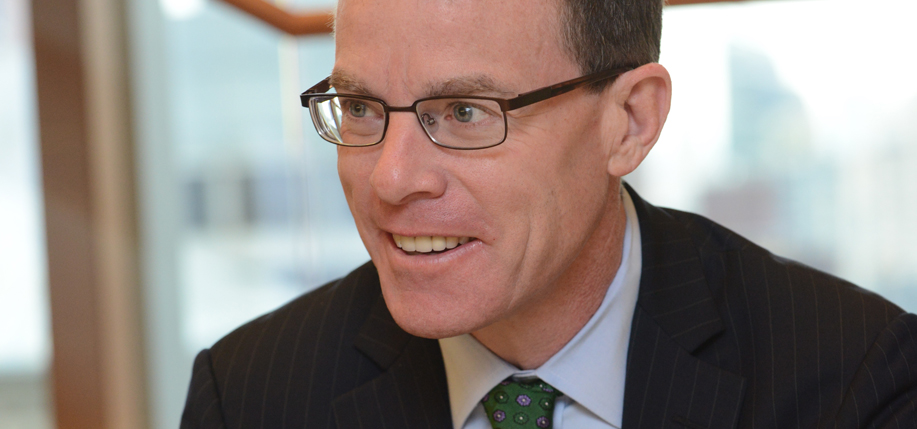
La historia de Tim Ryan es un ejemplo a seguir, ya que lo que necesitamos es un liderazgo con inclusión y diversidad, si queremos organizaciones prosperas y sostenibles. No olvidemos que el enfoque intelectual es el mejor.
The story of Tim Ryan is an example to follow, since what we need is leadership with inclusion and diversity, if we want successful and sustainable organizations. Let’s not forget that the intellectual approach is the best.
Tim Ryan’s leadership and willingness to walk the walk for inclusive leadership is phenomenal and is an excellent example more leaders should exhibit. As a former – Suite member and a minority, the courage and conviction he shows inspires me today. There are so many things that I have had to tip-toe around, to make sure I did not step out of bounds with my CEO. So many things were ignored that were clearly not inclusive leadership. Thank goodness the culture and times are changing to not only recognize employee differences, but create space and programs where discussions and experiences are a way to solve problems. Kudos to Tim!